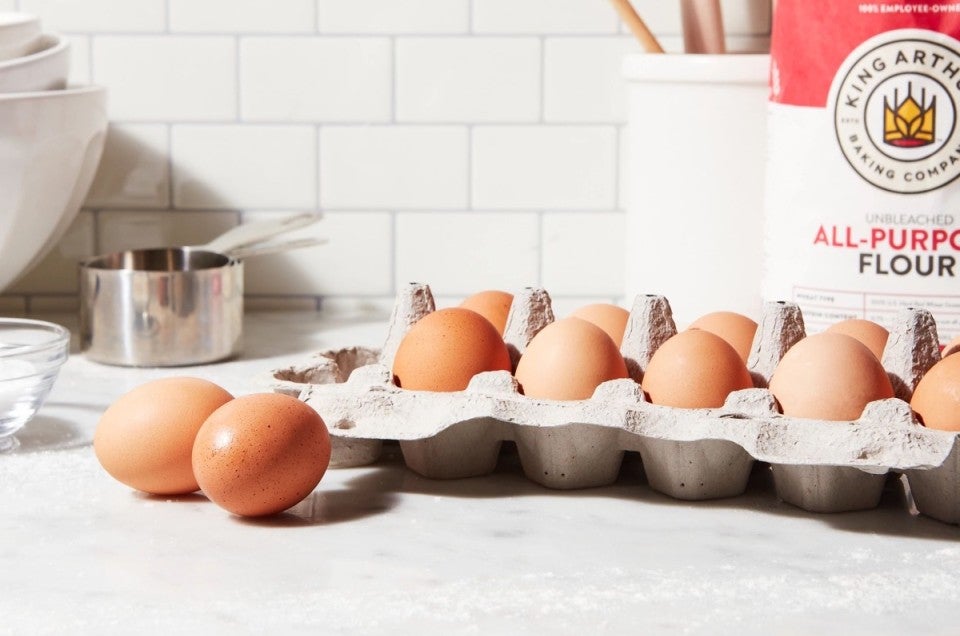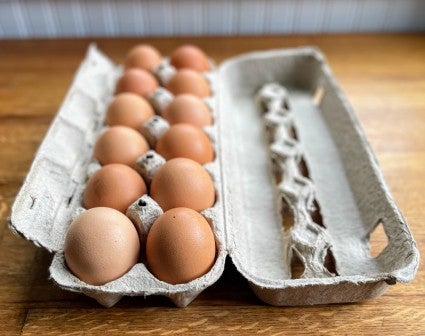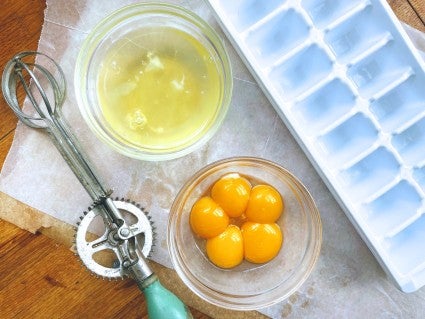Things bakers know: Yes, you can freeze eggs for baking
A simple solution for excess eggs.


You got a deal on eggs at the supermarket, or your backyard hens are overproducing. Whatever the reason, you now have a couple of dozen eggs and are starting to wonder if you’ll be able to use them all up before their “best by” date comes and goes.
No problem — just freeze them!

Freeze eggs for baking — really? Absolutely. Follow the tips and techniques below to safely and effectively freeze whole eggs, the whites, or just the yolks — and never again have to discard aging eggs, or those couple of leftover whites you didn’t know what to do with.
Since most baking recipes call for large eggs, that’s what we’ll talk about here.
For easiest handling, silicone molds are the way to go, as frozen eggs pop right out of flexible silicone. The wells in this cake mold, for instance, should each hold a whole egg, a couple of whites, or up to three yolks. (Heads up: At King Arthur, we only recommend the products that we, as bakers, truly love. When you buy through external links on our site, we may earn an affiliate commission.)
My container of choice is a large silicone ice cube mold designed to make 2” ice cubes. Each generously sized well can easily hold a single whole egg, yolk, or white. But it can also handle up to five yolks, three whites, or two whole eggs at a time if you want to combine your eggs for freezing.

Your second choice is flexible plastic (think ice cube trays you can twist). You’ll be able to pour half a whole egg (or one whole yolk; or one whole white, barely) into each ice cube-sized hole.
In a pinch, your standard metal muffin tin will work, though it’s more difficult to get frozen eggs out of a metal pan than a flexible mold or tray. Each well of the tin will hold two large eggs. How about a mini muffin pan? Its wells are half-egg capacity.

First, don’t freeze them in their shell; the USDA doesn’t recommend it.
Eggs can be safely frozen for up to a year; but for best results, use them within three to four months.

You made meringues and have leftover yolks. Or you made pastry cream and find yourself with leftover egg whites. If you don’t want to add those leftovers to a scramble, omelet, or frittata, it’s simple to freeze them for the future. Here’s how:
For yolks: Place the yolks in a bowl. For every yolk, add a tiny pinch of salt (or a generous 1/16 teaspoon sugar). Gently whisk the yolks and salt or sugar to combine, just until the mixture is pourable. Pour 18g (the weight of one large yolk, a generous tablespoon) into the well of your chosen container. Freeze as directed above. And when using, remember to reduce the amount of salt in your recipe to account for the salt in the yolks, if necessary.
For whites: If you plan ahead, you can simply slip each white into a well of your freezing container while you’re separating the eggs for your recipe. If you’ve already cracked the eggs and have ended up with a bowl of leftover whites, though, here’s what to do: Gently whisk the whites until just pourable (no need to add salt or sugar). Pour 30g (the weight of one large white, about 2 tablespoons) into the well of your chosen container. Freeze as directed above.

Place however many frozen whole eggs, egg whites, or yolks you need into a covered bowl, and transfer them to the refrigerator. Let them thaw gradually overnight. For quicker thawing, place eggs in a watertight plastic bag or other container and submerge in a bowl of cold water set in the sink; let cold water from the tap dribble gently into the bowl, to make sure the eggs stay cool as they thaw. Depending on how large the frozen egg blocks are, they'll thaw in as quickly as 15 minutes, or may take as long as 40 minutes or so. If you're in a hurry, gently massage the bag of softening eggs to help things along.
Still looking to use up an overabundance of eggs? The following egg-rich recipes will make a dent in your supply: Breakfast Slab Pie (12 eggs), Flourless Chocolate Nut Cake (10), Almond Roll (9), or Lemon Chiffon Cake (8).
Cover photo by Rick Holbrook; food styling by Kaitlin Wayne.


February 7, 2025 at 12:42pm
Will frozen egg whites be suitable for making meringue? I've frozen them in the past but not tried to whisk them.
February 18, 2025 at 3:23pm
In reply to Will frozen egg whites be… by Marianne (not verified)
Yes Marianne, frozen egg whites should still whip up nicely for a meringue after they have been thawed!
June 13, 2023 at 6:37am
three eggs beaten with five ounces if sugar, freeze, thaw and then bake in a fruit cake.
January 15, 2023 at 6:55pm
Once defrosted, how long do I have to use egg whites? It’s been about 24 hours since I took them out but I didn’t get around to baking today and want to use them tomorrow. Thanks!
January 21, 2023 at 3:06pm
In reply to Once defrosted, how long do… by Lauren (not verified)
Hi Lauren! When working with previously frozen egg whites, for the best results, we recommend using them within 24-48 hours after defrosting. Happy Baking!
January 13, 2023 at 6:31am
Would lyou consider a of gluten free
, sugar free & dairy free cake mix????in your collections of cakes, cookies, breads, etc?
.
January 15, 2023 at 10:05am
In reply to Would lyou consider a of… by Gerald Henry (not verified)
Hi Gerald, I can certainly suggest it to our product development team!
November 4, 2022 at 12:54pm
How does thawed egg whites work for macrons?
November 5, 2022 at 12:18pm
In reply to How does thawed egg whites… by Dor Nakamura (not verified)
Hi Dor, thawed egg whites will work fine for making macarons.
October 22, 2022 at 12:31pm
Excellent information! Thanks for the volume info under the illustration: 25 gr/about 2 tablespoons-half of a large egg. Discovering and using my freezer now more than ever.
For whisking, I'd use the blue (bread) whisk I got from KA decades ago. The coating is starting to crack and I'd love to replace, but don't see that item on your site now.
Pagination